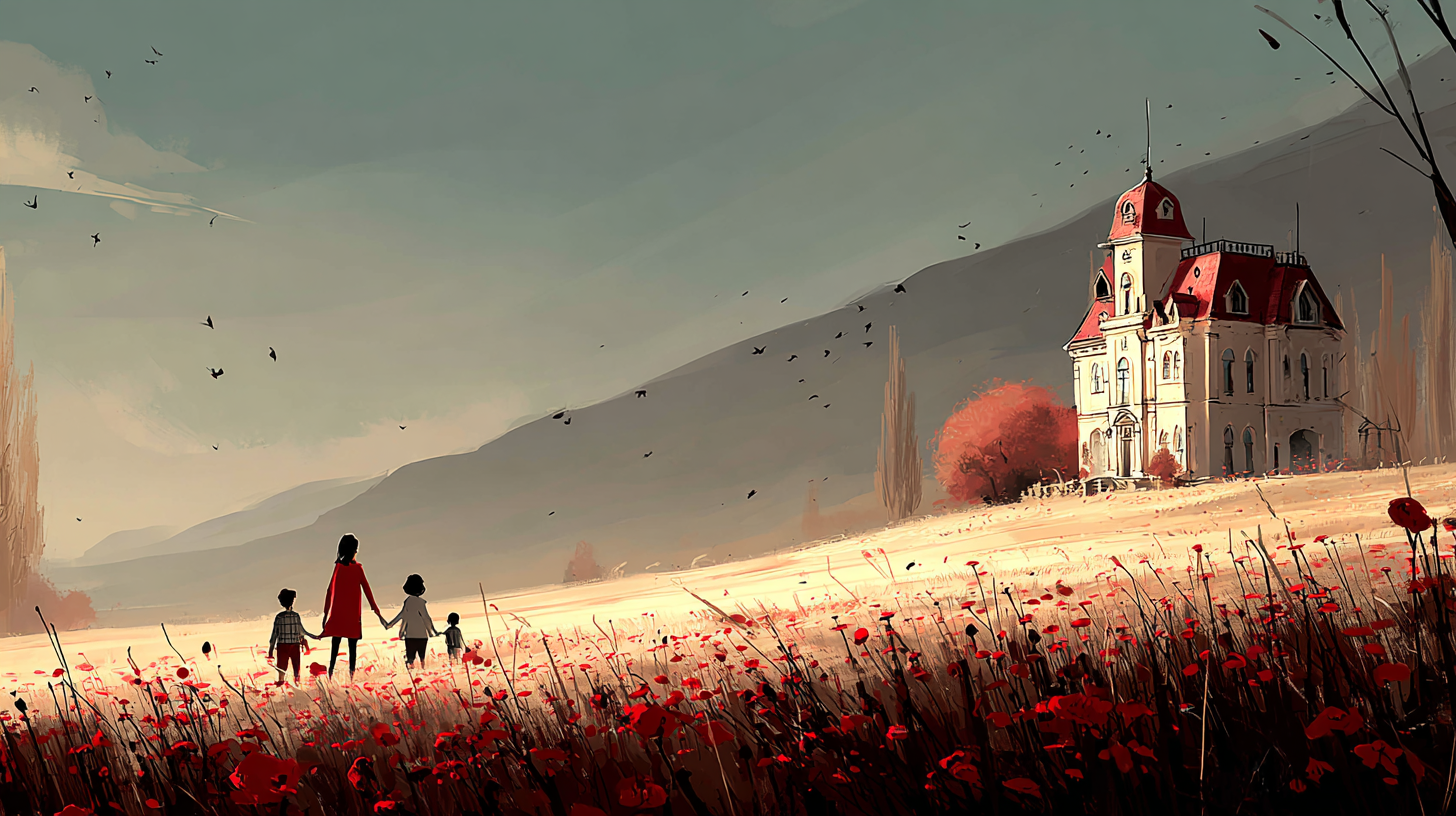“Estate” means land, houses, or money someone owns, often after they die.
「estate」は大きな土地や家、または人が亡くなった後に残すお金や財産のこと。
以下は英単語 “estate” に関するストーリー型学習コンテンツです。まずは大枠の意味を理解して最後の文章で確認しましょう。
主な意味(main meaning)
| 品詞 | 意味 | 発音記号 | 英語例文 |
|---|---|---|---|
| noun | (広い土地を持つ)財産、地所、所有地 | /ɪˈsteɪt/ | He inherited a large estate from his uncle. |
| noun | (死後の)遺産 | /ɪˈsteɪt/ | Her estate was divided among her children. |
語源(etymology)
「estate」はラテン語 status(状態、立場)に由来し、中世フランス語 estat を経由して英語に入りました。核となるイメージは「人が所有する状態・立場にある土地や財産」です。
類義語(synonyms)
| 類義語 | 例文 |
|---|---|
| property | She bought the property next to the park. |
| land | Farmers work hard to take care of their land. |
| fortune | He made a fortune in the stock market. |
| assets | The company’s assets include buildings and machines. |
反義語(antonyms)
| 反義語 | 例文 |
|---|---|
| debt | He was in deep debt after losing his job. |
| poverty | Many families live in poverty without enough food. |
コロケーション(collocations)
| コロケーション | 例文 |
|---|---|
| real estate | She works in the real estate business. |
| family estate | The old castle is part of the family estate. |
| estate agent | We asked an estate agent to show us some houses. |
| large estate | He owns a large estate in the countryside. |
2項表現(binomials)
| 2項表現 | 例文 |
|---|---|
| life and estate | He left his life and estate to his only son. |
| property and estate | Property and estate taxes can be very high. |
英語ストーリー(english story)
Story: The Unexpected Estate
When David’s grandfather passed away, his family was surprised to learn about a large estate in the countryside. The estate included not only a beautiful old house but also many fields and a small forest. None of them had ever visited it before, and David was very curious.
One Saturday, David’s parents decided to take him to the estate. As they drove through the gates, David’s eyes grew wide. “This looks like a castle!” he said. His father smiled and replied, “Yes, it’s part of our family estate. Your grandfather never talked much about it.”
Inside the house, they found old paintings, books, and letters. David’s mother explained, “According to the will, this estate is now divided among the family.” David did not fully understand the word “estate,” so she added, “It means the property and land that your grandfather owned.”
While exploring, David asked, “What can we do with it?” His father answered, “We could sell the property to a real estate company, or we could keep it as part of our family’s history.”
Later, an estate agent arrived to give them advice. He said, “Because this is a large estate, it could be very valuable. You could make a fortune if you sell it.” David thought about the word “fortune.” He had learned that it meant a lot of money. But his heart was not focused on money. He wanted to keep the land.
“Dad,” David said, “if we sell it, it will just become another business project. But if we keep it, we can protect the land and forest. It’s not only about property and estate, but also about family and nature.”
His parents looked at each other. They knew David was right. Many people lived in poverty, and they were lucky to inherit such a valuable estate. But money was not everything. They decided to keep the estate and open it to the local community.
From that day, David’s weekends were filled with new adventures—helping his parents take care of the land, planting trees, and showing children around the beautiful forest. The estate was no longer just about wealth. It became a place of life and estate, a bridge between the past and the future.
和訳
予期せぬ遺産
デイビッドのおじいさんが亡くなったとき、家族は田舎に大きな**estate(財産、地所)**があることを知って驚きました。そのestateには美しい古い家だけでなく、畑や小さな森も含まれていました。家族の誰もそこを訪れたことがなく、デイビッドはとても興味を持ちました。
ある土曜日、両親はデイビッドをそのestateへ連れて行きました。門を通り抜けると、デイビッドの目は大きく開きました。「お城みたい!」と彼は言いました。父は微笑んで、「そうだ、これは私たちのfamily estate(家族の所有地)の一部なんだ。君のおじいさんはあまり話したことがなかったんだよ」と答えました。
家の中には古い絵や本、手紙がありました。母は説明しました。「遺言によると、このestateは家族で分けることになっているの。」デイビッドは「estate」という言葉を完全には理解していなかったので、母は続けて言いました。「それはおじいさんが持っていたproperty and land(財産と土地)のことよ。」
探索の途中で、デイビッドは「これをどうするの?」と尋ねました。父は「不動産会社(real estate company)に売ることもできるし、家族の歴史として残すこともできる」と答えました。
その後、**estate agent(不動産仲介人)**がアドバイスに来ました。「これはlarge estate(大きな地所)ですから、とても価値があります。売ればfortune(大金)を得ることができるでしょう。」デイビッドは「fortune」という言葉を思い出しました。それはたくさんのお金を意味することを学んでいました。しかし彼の心はお金に向いていませんでした。土地を守りたいと思ったのです。
「お父さん、もし売ってしまったら、ただのビジネスの一つになってしまう。でも残せば、土地や森を守れるんだ。それはproperty and estate(財産や土地)だけの問題じゃなく、家族や自然のことでもあるんだ。」
両親は顔を見合わせました。デイビッドが正しいとわかっていました。多くの人がpoverty(貧困)に苦しんでいる中で、彼らはこのような価値あるestateを相続できて幸運でした。しかしお金がすべてではありません。彼らはestateを残し、地域の人々に開放することに決めました。
その日からデイビッドの週末は新しい冒険でいっぱいになりました。両親と一緒に土地の世話をしたり、木を植えたり、子どもたちに美しい森を案内したりしました。estateはもはやwealth(富)だけのものではなくなりました。それはlife and estate(命と財産)、過去と未来をつなぐ場所になったのです。
Q&A
Q: 「estate」と「property」はどう違いますか?
A: 「estate」は特に広い土地や建物の集合体、遺産を指します。「property」は家や土地など具体的な所有物一般を広く指す言葉で、アパート1室など小さな単位でも使えます。
Q: 「estate」と「land」はどう違いますか?
A: 「land」は単に土地そのものを意味します。一方「estate」は土地に加えて建物や関連する財産を含む場合が多いです。
Q: 「estate」と「fortune」はどう違いますか?
A: 「fortune」は大金や富を表し、土地や建物といった形のあるものを含みません。「estate」は具体的な土地や建物などの財産を指します。
Q: 「estate」と「assets」はどう違いますか?
A: 「assets」は会社や個人が持つ財産全般(建物・お金・機械など)を指す専門的な言葉です。「estate」は特に土地や建物、遺産に焦点を当てます。
Q: 「estate」と「real estate」はどう違いますか?
A: 「estate」は土地や建物の財産そのものを意味します。「real estate」は不動産全般や不動産業界を指す言葉で、仕事や市場の話でよく使われます。
Q: 「estate」と「family estate」はどう違いますか?
A: 「family estate」は家族や一族が代々所有する土地や屋敷を意味します。「estate」はもっと広く、個人の所有地や遺産も含みます。
Q: 「estate」と「estate agent」はどう違いますか?
A: 「estate」は土地や建物を指し、「estate agent」は**それを売買や賃貸の仲介をする人(不動産業者)**を意味します。
Q: 「estate」と「large estate」はどう違いますか?
A: 「large estate」は「estate」の一種で、特に広大な土地や建物のまとまりを強調するときに使います。



コメント